|
Access: |
Ribbon:
CAM tab
 Job panel
Job panel
 Pattern
Pattern

|
When the same geometry instances occur multiple times in a model, you can take advantage of the toolpath patterning feature. This allows you to only generate a toolpath for a single instance and then duplicate it for the remaining instances. Making use of patterning can speed up the entire programming process since all changes to a pattern take effect immediately and no toolpath has to be recalculated or updated.
To create a new toolpath pattern you first need to select the operations to be patterned/duplicated from the CAM Browser, and then right-click and select Add to New Pattern from the pop-up context menu.
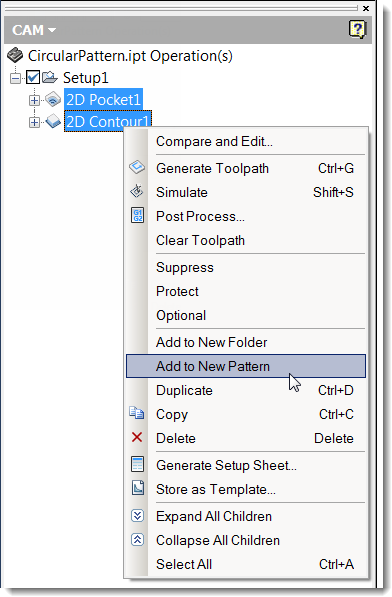
Selecting Add to New Pattern
This creates a new folder containing the selected operations and then creates the pattern in that folder.
If you already have the operations to pattern in a folder, you can right-click on the folder and choose New Pattern instead.
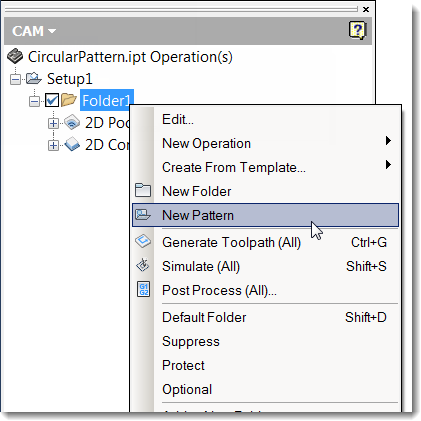
Adding a pattern to an existing folder
Either method opens the Operation dialog box, which offers the following pattern types:
- Linear Pattern
- Circular Pattern
- Mirror Pattern
- Duplication Pattern
- Component Pattern
Restriction: Component patterns are available in assemblies only.
You configure the linear and circular patterns much like the Rectangular Pattern and Circular Pattern functions in Inventor.
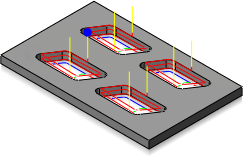
Linear Pattern toolpath example
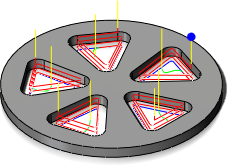
Circular Pattern toolpath example
The Duplication pattern mode is slightly different in that you simply choose a number of points where the toolpaths should be instantiated (from the origin of the original toolpath).
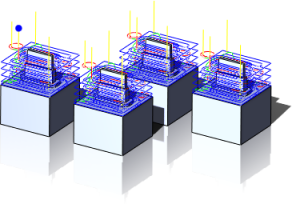
Duplication Pattern toolpath example
Pattern Nesting and Previewing
Patterns can be nested by putting the patterns into other pattern folders. However, be aware of the following two limitations when previewing a pattern:
- Only the first operation is previewed when previewing a pattern comprised of multiple operations.
- When previewing nested patterns, only the topmost pattern is previewed with the first operation.
In the example shown below, Pattern2 (a circular pattern) is nested within Pattern1 (a linear pattern), but is not visible in the Pattern1 preview. Observe also that Drill1 is only shown as part of the linear pattern.
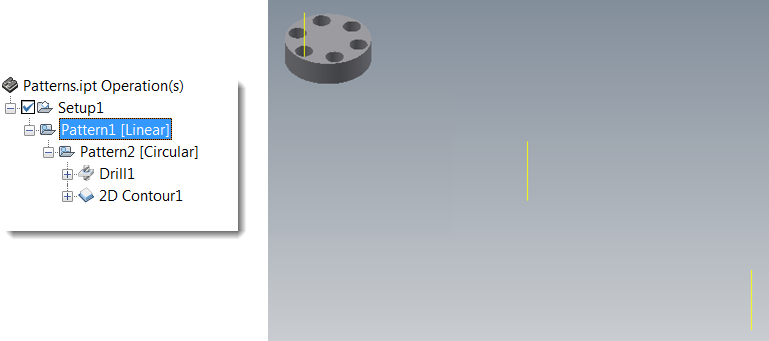
Pattern Ordering
The ordering of the operations within the pattern may be controlled by setting the Operation order. The available ordering options are:
- Preserve order - Machines all operations in each instance of the pattern before moving to the next instance.
- Order by operation - Machines all occurrences of each operation in the pattern before changing to the next operation.
- Order by tool - Machines all operations in the pattern that use the current tool before changing tools.
Overriding the WCS Offset
Regardless of the pattern type, and before finishing the pattern operation, be sure to click the Post Process tab in the Operation dialog box to access the Override WCS Offset check box.
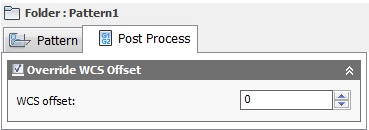
Enabling this check box and entering the WCS offset number overrides the WCS offset defined in the setup for all the toolpaths within the pattern folder.
Simulating Patterns
Once the pattern has been created, you need to select the pattern folder in the CAM Browser to simulate or post process the entire pattern with all the duplicated toolpaths. If you only select the operations contained within the pattern folder, only these are simulated disregarding any pattern.